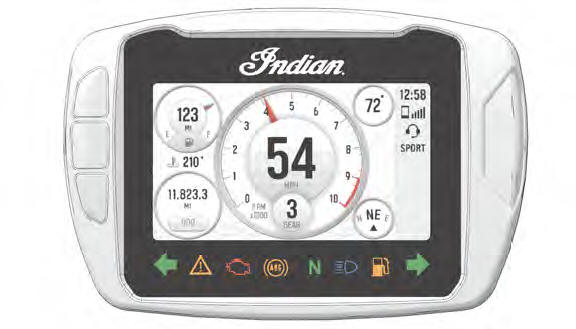 Indian FTR 1200 - Owner's Manual > Ride Command Display (if Equipped)
Indian FTR 1200 - Owner's Manual > Ride Command Display (if Equipped)

For the latest information about your Ride Command display, including software updates, please visit: https://ridecommand.indianmotorcycle.com
WARNING Do not enter information while operating your vehicle. Failure to pay attention to operating your vehicle could result in loss of control, injury, or death. You assume all risks associated with using this device. Read your User Guide.
WARNING Driving while distracted can result in loss of vehicle control, crash, and injury. We strongly recommend that you use extreme caution when using any device that may take your focus off the road. Your primary responsibility is the safe operation of your vehicle. We recommend against the use of any hand-held device while driving and encourage the use of voice-operated systems when possible. Make sure you are aware of all applicable local laws that may affect the use of electronic devices while driving.
Before riding with your new display, do the following:
- Read this entire manual.
- Familiarize yourself with the features and operations of the display while the vehicle is stationary.
- Download the Indian Ride Command app from the Apple/ Google Play store and create your personalized account.
NOTE Using the display for an extended period of time while the vehicle's engine is off can drain the battery.
- Touch screen display compliance statement
- Ride command display screens
- Traction control/anti-lock brake system (ABS)
See also:
 Indian FTR 1200 - Owner's Manual > Multi-function Display Modes
Indian FTR 1200 - Owner's Manual > Multi-function Display Modes
With the ignition switch on, use the right-hand trigger switch to toggle through the modes of the multi-function display and to change settings in the display. The following display modes are available: Odometer Trip Odometer Engine Speed Gear Indicator Battery Voltage Engine Error Codes Average Fuel Economy Instant Fuel Economy Engine Temperature
 Indian FTR 1200 - Owner's Manual > Touch screen display compliance statement
Indian FTR 1200 - Owner's Manual > Touch screen display compliance statement
This device complies with part 15 of the FCC Rules. Operation is subject to the following two conditions: (1) This device may not cause harmful interference, and (2) this device must accept any interference received, including interference that may cause undesired operation.
 Ducati Scrambler
Ducati Scrambler Fantic Caballero 500
Fantic Caballero 500 Indian FTR 1200
Indian FTR 1200 Moto Guzzi V85 TT
Moto Guzzi V85 TT Royal Enfield Bullet Trials Works Replica
Royal Enfield Bullet Trials Works Replica Triumph Scrambler 1200 XE
Triumph Scrambler 1200 XE Triumph Street Scrambler
Triumph Street Scrambler Yamaha XSR700
Yamaha XSR700 Ducati Scrambler 800
Ducati Scrambler 800 Moto Guzzi V85 TT
Moto Guzzi V85 TT Triumph Scrambler 1200 XC
Triumph Scrambler 1200 XC